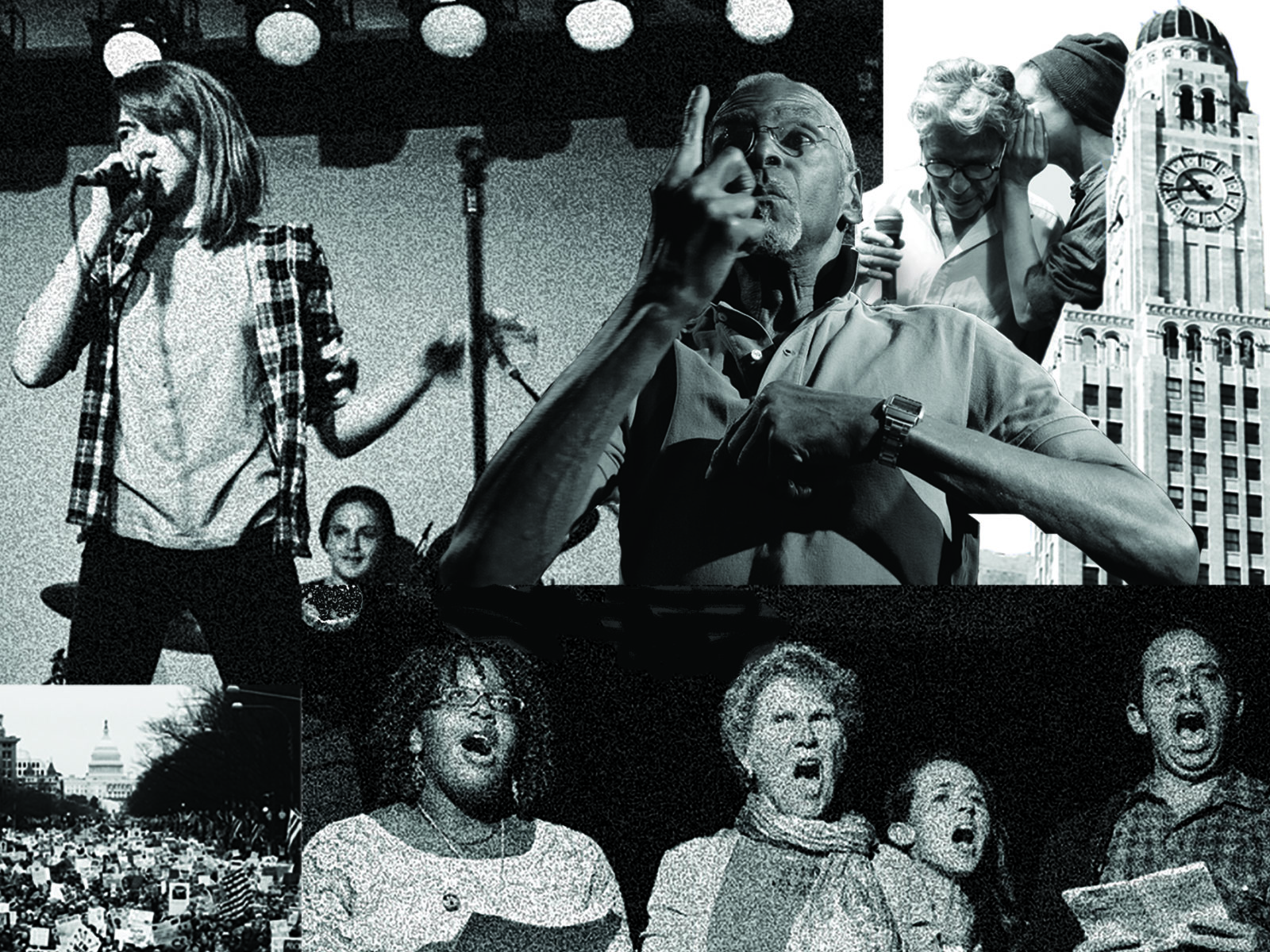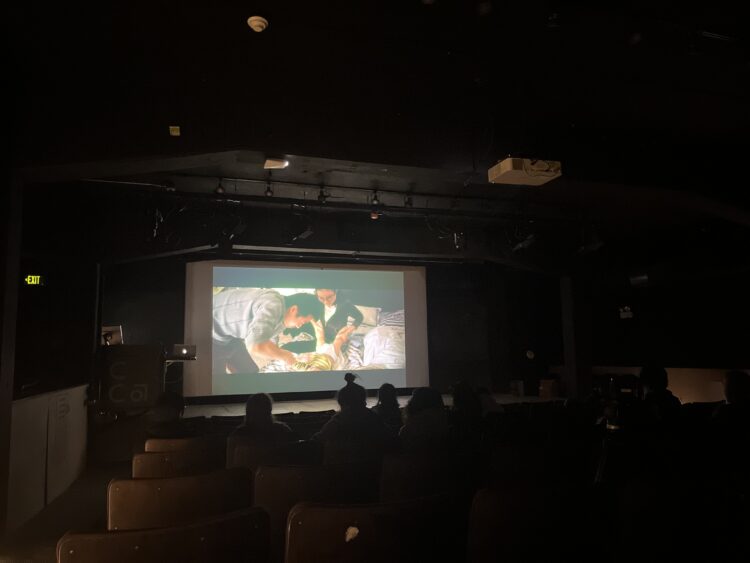The TEAM Reimagine Protest Songs With Teens and Baby Boomers

During a Q&A in London in 2009, the artist collaborative known as The TEAM were asked “How are Americans dealing with the fact that you’re not a superpower anymore?” It was a question that stuck with them, and over the years it became increasingly relevant. The TEAM have turned their response into a concert, a Creative Capital project, called Primer for a Failed Superpower. Hoping to unite generations of Americans, from teens to Baby Boomers, the concert features a three-generation ensemble who will perform covers of songs that have celebrated and questioned what it means to be an American, including songs by Black Sabbath, Marvin Gaye. The project premieres at Roulette in Brooklyn, August 22-23, 2017. Furthering their commitment to bringing people together, The TEAM are offering tickets on a pay what you’re able basis, and no one will be turned away for lack of funds.
We caught up with the director, Rachel Chavkin, Music Supervisor Orion Stephanie Johnstone and Associate Director Zhailon Levingston to learn more.
Hillary Bonhomme: This performance will feature rearranged protest songs from different decades. Can you elaborate on the goal that you share as an ensemble? What type of reaction are you hoping for by rebuilding songs that encapsulate one momentous period in history and using that new piece of music to address a different time?
Rachel Chavkin: The goals of this piece are intertwined with our goals for the process: to first create a rehearsal room that unifies a multi-generational, multi-racial, multi-gender ensemble, through the act of singing re-imagined justice songs, and to make constant space for formal and informal conversations about aging, hyphenate backgrounds, personal and cultural traditions, and overlapping histories. This all feels to us like a radical act.
Zhailon Levingston: The goal here is to really use these rearrangements to have new conversations about the themes of these protest songs. New conversations that are political, theatrical, cross generational, and inspiring all at the same time.
Rachel: And I think it’s fair to say that, for the creative team and those members of the choir we’ve been developing the show with, the process thus far has been spiritually nourishing. We’ve interviewed activists around the country (which feature as video snippets in the show). During a workshop a 13-year old and a 66-year old woman “covered” each other by sharing their formative political memories; the 13-year old, an African American Muslim woman, told the older woman’s story of being a young white woman stuck in traffic and asking her mother why they were holding for so long, and her mother turned back and explained, “Well honey, people are marching”—it was the march in Selma across the Edmund Pettus bridge. And these moments all feel palpable when, for example, 3 generations of women come together to sing, in complex hocket, the opening words of the feminist anthem “Bread and Roses.”
Orion Stephanie Johnstone: We trust that the process will be felt in the performance. And also these are incredible songs. They fire us up, and we hope anyone who joins us for the concert will feel the same! The final goal is to leave the project—as individuals, as an ensemble, and for the audience—with our muscles primed for resistance to oppression and to embody the possibility of collective liberation that we know, in our blood and in our bones, is possible.
Hillary: You embarked on this project with the idea that every generation was affected by a formative national event, i.e. Berlin Wall, September 11th, in working with different members, were you surprised by the range of connectivity to these events? Were younger members’ perspectives shaped more or less by these events than you thought they’d be?
Zhailon: Each generation shared similar themes of disruption, epiphany, fear and courage. Even the younger cast members have been shaped by an event that brought these themes to the forefront of their lives.
Rachel: In the above question, I shared one of the most profound moments that arose during the process amidst conversation around formative political memories. It hasn’t been surprising how many young people’s answers have been September 11th. Though additionally, many of the youngest people we’ve worked with over development answered not 9/11 but the election of President Obama, and the hope it gave them. I think what’s been palpable is our younger members’ are pretty damned clear and fired up about fighting this new administration. Admittedly we have a self-selecting group of politically inclined young people, but they seem inspired by their outrage. And our older members’ have seemed to resonate strongly with that motivation.
Hillary: Part of The TEAM’s process is to “upcycle” text from literature with the intent to create something completely new. How recognizable will these familiar melodies be in the performance of Primer?
Rachel: I think everyone in the audience who knows a particular song will recognize that song, though some might take a little while. Each of the composers chose the song(s) they worked with, so there was a base of respect, love, or occasionally revulsion, for the original, and thus the core melodies or lyrics have been preserved. But we’re also planning to name the compositions via slides when they’re being performed– obfuscation isn’t the goal, and we want people to know at least a sliver of context about the music and who re-orchestrated it, as we think it deepens the impact.
Orion: Some specific examples are:
The classic union song “Which Side Are You On?,” as re-imagined by Martha Redbone and Aaron Whitby, is the same melody as the original, but arranged to be more exuberant and body-percussion-fueled, with a new verse asking the listener “which side are you on?” in terms of indigenous rights, Black Lives Matter, etc.
Black Sabbath’s “War Pigs” has been reimagined by Stew and Heidi Rodewald, incorporating text from “Lift Every Voice And Sing” by James Weldon Johnson, and the “Battle Hymn of the Republic.”
Heather Christian created a mash-up of Marvin Gaye’s “What’s Going On” with 4 Non Blondes’ “What’s Up,” that also weaves in a little bit of The Beatles’ “A Day in the Life.”
“Bread and Roses”, from the text of a 1911 successful women-led immigrant workers’ strike, is re-imagined as an intersectional feminist symphony. The familiar melody of “Bread and Roses” is shared, single word by single word, by three generations of women, as if these women are sharing the same breath, and then all genders join in a robust chorale as the refrain of The Internationale appears.
Hillary: So much of your art is based in having an ensemble to incubate ideas and build them onto people. Was Creative Capital’s assistance especially helpful in keeping this machine of an ensemble running smoothly?
Rachel: Creative Capital’s commitment to a project, whatever the length of its development, was profoundly helpful in keeping the particular machinery of Primer running smoothly! This project has been a long time coming for us. And having the spiritual and financial and logistical support from you all has sort of been this rope that we could grip during the hike. It got us through the more confused moments as it shifted from a potentially narrative work to an entirely non-narrative concert, it helped us refine and fortify the values at the core of the process and performance, and it helped keep us accountable to ourselves. Being at the retreat and hearing about other Creative Capital projects was a big part of that. And being flexible and always down for a discussion and consistently encouraging (Ruby!) has made all the difference.
Primer for a Failed Superpower premieres at Roulette August 22-23. Tickets are offered on a pay what you’re able basis; no one will be turned away for lack of funds. Advance tickets start at $10. All ages welcome.
